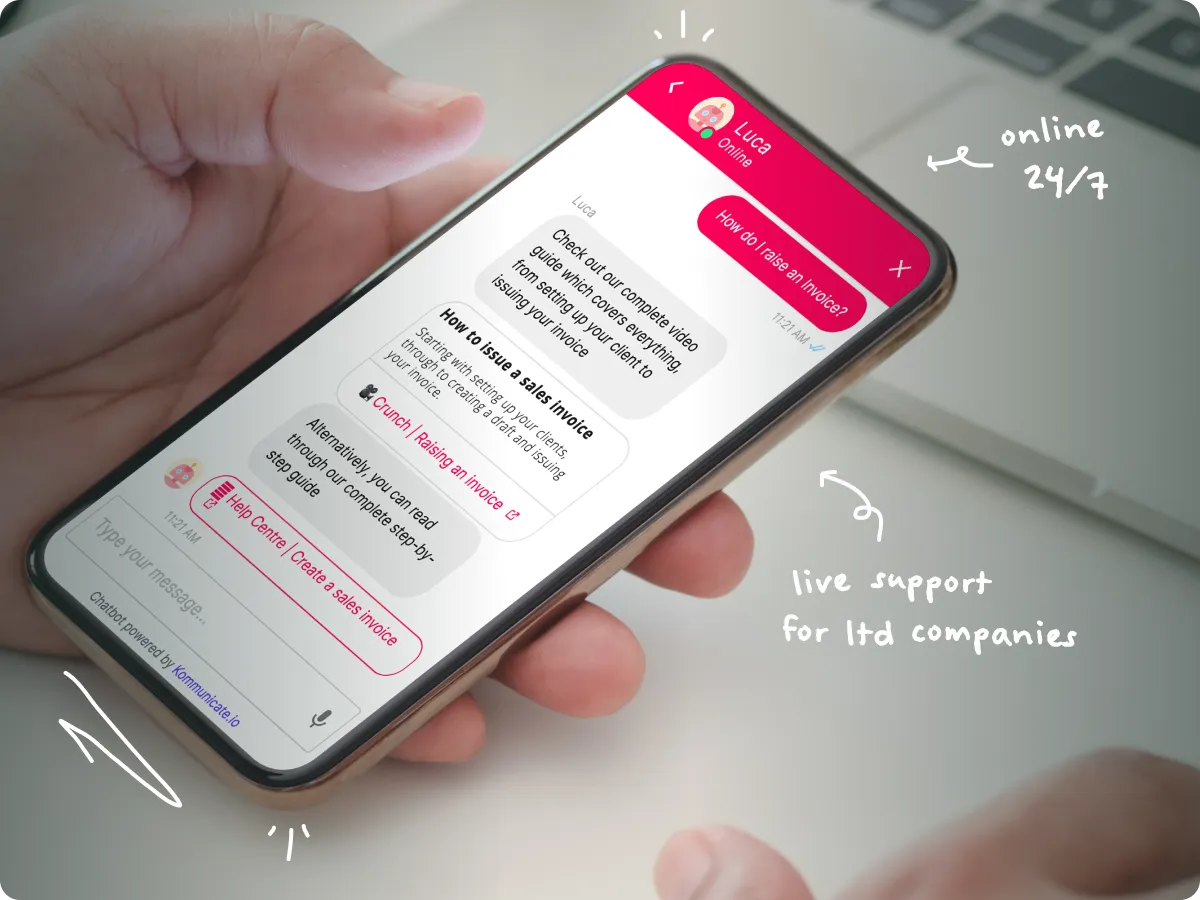Setting up as a limited company is one of the smartest and most tax-efficient ways to get paid for your work.
With a limited company set up, you get to define your brand, own everything you do, run your business in the most tax-efficient way, and pitch for work you wouldn’t be able to get as a sole trader.
If you’re not quite sure what it all entails, check out our knowledge hub for helpful articles and resources. You can then register a company with our easy to use Crunch Formations service.
If you’re ready to learn how to set up a limited company, here’s what you need to know.
How to set up a limited company in four simple steps
1. Choose which type of limited company to set up
Once you’ve decided to set up a limited company, you have to choose which type you wish to form. The two main choices are:
- Private Limited Companies (LTDs)
- Public Limited Companies (PLCs)
Most freelancers, contractors, start-ups and small businesses will opt for a Private Limited Company, as PLCs must have a minimum share capital of £50,000, at least two shareholders, two directors and a qualified company secretary.
There’s no minimum share capital requirement for LTDs. You can set up a LTD with a single share worth £1 if you wish.
2. Pick your company name
This bit is equal parts the most fun and most frustrating part of the whole process for most new limited companies. Much like a web address, your company name has to be completely unique. You can differentiate in a few ways to guarantee a unique name – for example, a limited company name can use either “Limited” or “Ltd.” (i.e. “Crunch Limited” or “Crunch Ltd.”). You can find available company names using our Crunch Formations company name checker, but with over 1,500 companies formed every day, your preferred name may not be available.
Stuck for ideas? Here are some ways to create unique company names.
3. Forming a limited company
If step two was the fun and frustrating part, this one’s the tricky and bureaucratic part – or at least it’s seen to be. It’s actually really simple if you’re organised though. With Crunch you can go online and set up your limited company yourself in about ten minutes, and all for the cost of a takeaway pizza.
You just have to supply certain personal details to help Companies House identify you as a company director. These include:
- Letting them know what type of business your limited company will carry out by submitting a SIC code (Standard Industrial Classification code) for your business. You can select the most appropriate code from the Condensed SIC code list online at Gov.uk which is maintained by Companies House.
- Decide what addresses you want to register for your business. You’ll need to choose your Registered Office Address, and provide a service address. We’ve written a separate article about the types of addresses you must provide to Companies House and how to avoid potential impacts on your privacy by not publicising your residential address.
- Decide on the ownership of your company – how many shareholders do you want and how many shares will they have each (known as their shareholding)? We explain this in our article, ‘What are company shares, share value & share capital?
Once you’ve done this, you’re good to go. Companies House will often have your limited company formed in a few hours.
4. Complete the incorporation process
Companies House is responsible for all limited company registration in the UK. Their website provides detailed information on how to go about the process, or you can use a service like our Crunch Formations to simplify things.
The following documents must be completed and returned to Companies House in order to complete the incorporation process. Often, your company formation agent or accountant will complete these on your behalf:
- Memorandum of Association – limited company name, location, business type
- Form 10 – director’s names, addresses and registered limited company address
- (this doesn’t have to be where you work from but will be where the legal correspondence from HMRC and Companies House is sent)
- Form 12 – states the limited company complies with the terms and conditions of the Companies Act
- Articles of Association – outlines director’s powers, shareholder rights etc. (this is often provided by the formations company that sets up the limited company).
And that’s how to become a limited company! What do you need to do next?
Well, there are a couple more bits of admin you should take care of and there are those pesky reporting and filing responsibilities you need to stay on top of.
Simple admin first, you’ll need a business bank account for your limited company. We’ve written a handy guide to what to look for in a good business bank account.
You’ll also need some small business insurance to cover you and your business for any work you’re doing.
How much does it cost to set up a limited company?
Register a limited company costs £10, or is completely free when you sign up to accounting with Crunch. We’ll even refund your fee if you take out our Small Business Insurance, or open a Barclays business bank account through us.
We’ve helped set up over 10,000 limited companies. Get your limited company set up in just a few minutes with Crunch Formations.
Your duties and responsibilities as a limited company director
We’ve written a detailed article with all the info about your responsibilities as a limited company director, what you need to file and what the deadlines are. But in summary, as a limited company director, you have certain duties and legal responsibilities. These include:
- Your newly set up limited company must be registered at Companies House
- Annual accounts and Confirmation Statements must be completed and filed with Companies House every year by the due date
- You’ll need to maintain and submit a record of anyone who has significant control over the limited company. A person of significant control is someone that holds more than 25% of shares or voting rights in a company, has the right to appoint or remove the majority of the board of directors or otherwise exercises significant influence or control. This is known as the PSC register.
- HMRC must receive your accounts every year.
- An annual return must be completed and any Corporation Tax owed must be paid to HMRC within nine months and one day of the limited company year end.
- Register for Self Assessment and send a personal tax return to HMRC every year (this requirement does not apply if your company is a non-profit organisation, such as a charity, and you didn’t get any pay or benefits).
- Follow the company’s rules, as shown in its articles of association.
- Keep company records and report changes.
- Tell other shareholders if you might personally benefit from a transaction the company makes.
You may engage other people to manage some of these things day-to-day (for example, an accountant), but you’re still legally responsible for your company’s records, accounts, and performance. You may be fined, prosecuted, or disqualified if you don’t meet your responsibilities as a director.
Certain people are prohibited from acting as a director of a company, including persons under 16 years of age, bankrupts, and disqualified persons. While there is no mandatory qualification required to be a director, a director is required to perform the duties outlined above and must be capable of doing so.
As a director, you must make decisions for the benefit of the company and not yourself. This may seem confusing if you are the sole shareholder, employee, and director, but a decision that may benefit you personally may adversely affect the company’s performance.
But isn’t it difficult to be a limited company director?
Short answer: it shouldn’t be.
Traditionally, being a sole trader has been thought of as the easiest option for running a small business. As a sole trader, your tax responsibilities are easy to account for, if not necessarily as efficient as they could be. But many of our clients have enjoyed the benefits of switching from a sole trader set-up to a limited company business structure.
It seems wrong for a freelancer, contractor or small business owner to be put off saving tax because of the perceived hassle involved.
The key to getting it right
As a freelancer, contractor or small business owner, it’s important to have the systems in place to take advantage of the tax-savings afforded by a limited company without having to spend ages on irritating admin duties. You shouldn’t have to pay astronomical accountancy fees, either.
You’ll know you’ve got the right accountancy solution when your accountant is doing most of the work for you and leaving you with greater take-home pay. Being a limited company director should be blissfully easy, and Crunch ensures it is.
Preparing a business plan
Writing a business plan can help you figure out whether or not your business idea has any legs.
Once you’re able to prove that you’ve done the market research and know how you’re going to provide the service to customers sold on the basics, you can use your business plan to convince potential sources of finance, investors, partners, and employees that you’re worth working with.
Our article on How to write a Business Plan will give you a better idea of how to get the ball rolling.
Maintaining your limited company
There are many horror stories of freelancers or contractors who’ve had a nightmare with running a limited company, either because of accountants who left them to fend for themselves or a hackneyed attempt at DIY accounting.
One of the important jobs of a good accountancy service is to ensure that you spend as little time on your accounting as possible. At Crunch, our service combines online accounting software with expert accountancy advice, so that you have everything you need in one place.
The bread and butter of running a limited company is drawing up and sending invoices, plus keeping a record of expenses. Both of these can easily be done if you use online accounting software, which provides templates, automatically calculates VAT (should you be VAT registered) and enables simple recording of expenses. These are the same processes you’ll have been used to as a sole trader, but now you need to make sure that you keep on top of these to understand how your business is performing and how much you can take in dividends.
Preparing and filing tax returns
Our article “Limited company directors: What you need to file with HMRC & Companies House” outlines your tax-paying duties and deadlines. What’s important to keep in mind is how crucial it is to have a good accountant and sophisticated online accounting software (Crunch provides both) with which to take away the strain.
For example, with Annual Accounts, you barely have to do a thing – the accountants our end will perform all the necessary actions, leaving you to simply approve your accounts. It’s annual accounts at the click of a button!
If you’re registered, VAT is simple because whenever you draw up an invoice, the VAT’s automatically added. When it comes to an actual VAT return, the Crunch system will do the calculations and you can file the return directly from your Crunch account each quarter.
Dealing with your tax paying and filing duties can become a muddle when business owners keep all their information in separate places. However, when it’s all organised in one secure online system, the information is readily available and it becomes significantly easier to file returns and accounts for taxes. If there are any problems, our team of expert accountants are on hand to help.
Claiming back pre-trading expenses from your limited company
It’s entirely possible that you have incurred business costs prior to forming your limited company. You can claim ‘pre-trading’ expenses for things like:
- Computer equipment and software
- Domain name registration
- Office rent
- Business insurance
- Stationery
- Accountancy costs
- Travel costs.
Just remember that the expenses have to have been solely for business and not personal use. You’ll also need your receipts and proof of purchase as well, as you would for any company trading expense. Bear in mind that any training costs incurred prior to incorporation aren’t allowable, nor are preliminary activities such as writing a business plan or negotiating contracts.
There is one final bit of good news. You can claim any expenses incurred within seven years of forming your company. Make sure you keep every receipt or invoice and get it filed when running a business – they’ll always come in handy.
Who can view my company information?
This is a common question when incorporating a limited company, and the short answer is: anyone. Once a company is formed Companies House make your company information available to anyone via their website.
Anyone can use the Companies House Register, and as long as you know a firm’s company name (not their trading name) or company number, you can look them up and request information.
What information is available? A prospective nosey parker will be able to see past accounts, annual returns, as well as details of company directors, company officers, allotment of shares, and details of Persons of Significant Control.
You may want to consider using the address of your accountant, formation agent, or a registered office service for your official Registered Office to give yourself more privacy, Crunch can offer this service. We can also offer a Service Address facility though our partners Hoxton Mix.
Get an accountant
Well, we would say this, wouldn’t we! Getting an accountant is a great way to keep on top of your finances. They’ll remind you of important tax dates and payments due, show you ways of keeping your accounts in excellent shape, advise you on allowable expenses and how to report them so you’re as tax efficient as possible.
They can help you with things like estimating how much tax and NI you’ll need to pay every six months or quarterly for VAT. They’ll also help to ensure you’re not forgetting a payment on account, which catches many people out every year.
Find out more Crunch’s accounting for limited companies service.
.svg)









